Homeowner Plans To Put Up A Sign, Warning Neighbors That Their Trespassing Cats Will Be Taken To A Shelter
You want to prevent your neighbor's cat from entering your property. While cats are lovely, they can be bothersome to homeowners who aren't particularly fond of felines.
When you own a dog, they become even more inconvenient. The natural enemies can create a headache-inducing mess in your garden during the chase.
So how do you deal with trespassing cats? First of all, you have to be humane about it.
These are creatures who also deserve love. Don't chase them away by hurting them.
Also, remember that while they're domesticated, they still retain their hunting instincts. When they come into your yard, they are likely looking for food.
Remove any potential sources of food from your garden. This will decrease the chances of attracting them to your yard.
Afterward, check your home for cramped spaces and block them all. Cats prefer warm and dark spots to escape from people and predators.
They frequently hide in crawl spaces, beneath decks, and in other enclosed areas. Use lattice or chicken wire to keep them from entering those places. But before installation, make sure that there aren't any cats or critters inside.
A variety of commercial products also help keep the cats away. In other words, there are multiple ways to keep properties free of cats.
And yet, one specific owner is tired of dealing with all the inconveniences that come with the situation. So they decided on a different idea instead.
This property owner is just tired of dealing with neighbors' cats.
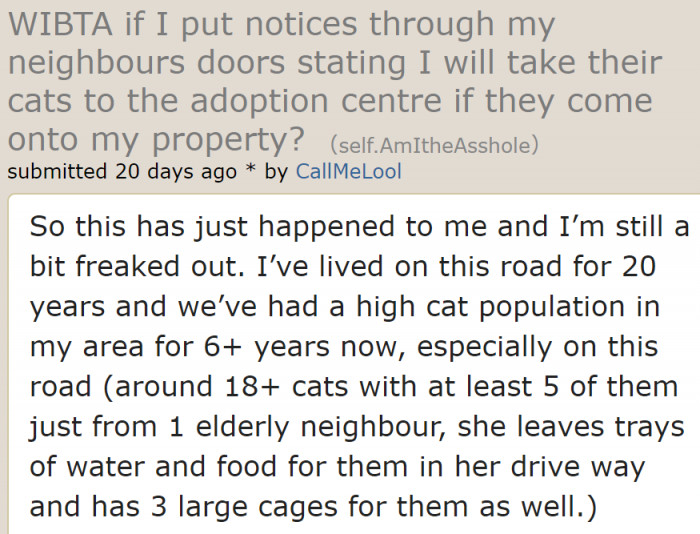
The original poster (OP) owns a dog, which makes things worse.
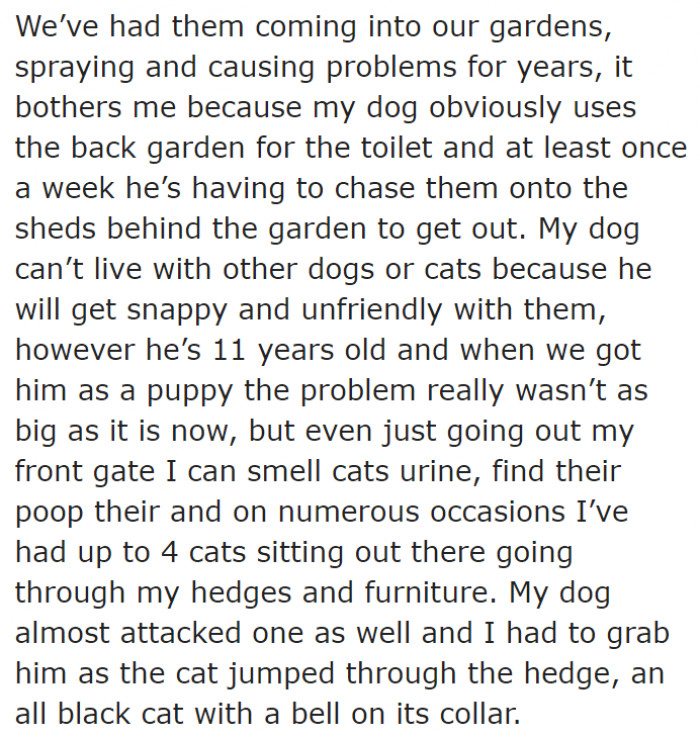
This was probably the last straw.
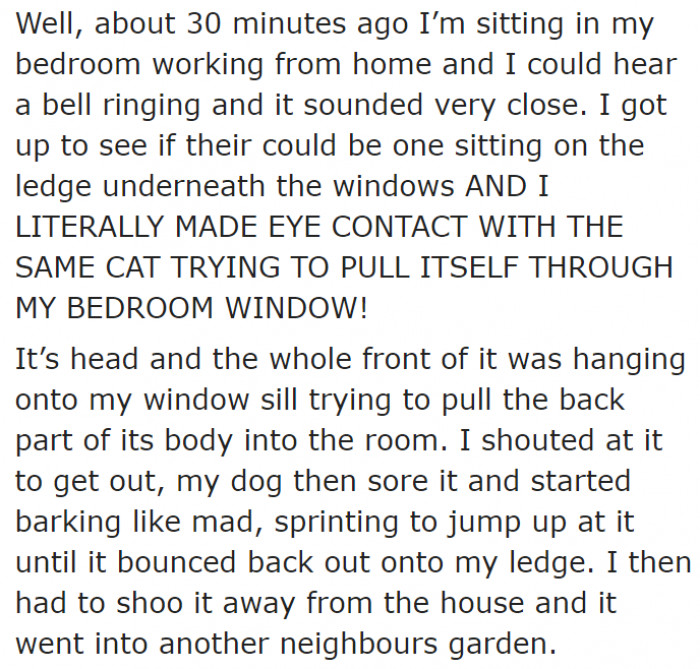
Understanding the psychology behind pet ownership can illuminate why some neighbors react strongly to trespassing cats. Research shows that pet owners often project their own feelings onto their animals, attributing human-like emotions and intentions to them.
This anthropomorphism can lead to heightened emotional responses when pets venture onto others' property, as a study from the University of Pennsylvania indicates. As a result, clear communication between neighbors about pet boundaries can alleviate misunderstandings and foster community harmony.
Practical Tips for Resolution
One effective way to resolve disputes over trespassing pets is to initiate a friendly conversation with neighbors. Dr. Mark Williams, a conflict resolution expert, suggests framing discussions around shared concerns rather than accusations.
For example, expressing worry about potential harm to pets can create a collaborative atmosphere. Additionally, offering to discuss possible solutions together encourages a sense of partnership rather than opposition, leading to more constructive outcomes.
Cultural Attitudes Towards Pets
The decision to warn neighbors about trespassing cats reflects differing cultural attitudes toward pet ownership and freedom.
Research in cultural psychology suggests that beliefs about animals can vary widely, influencing how pets are treated within communities.
Dr. Karen Ho, a sociologist, emphasizes that understanding these cultural differences is crucial for fostering community harmony.
In some cultures, free-roaming pets are considered normal, while in others, stricter boundaries are enforced.
The OP has no idea whose cats are trespassing on their property.
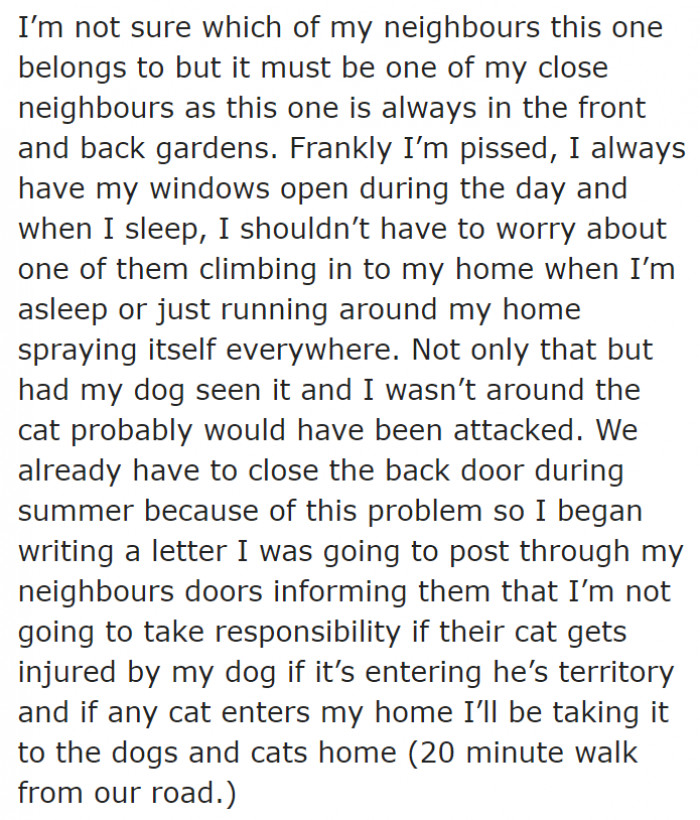
The OP's brother thinks that putting up a sign is a bad idea.
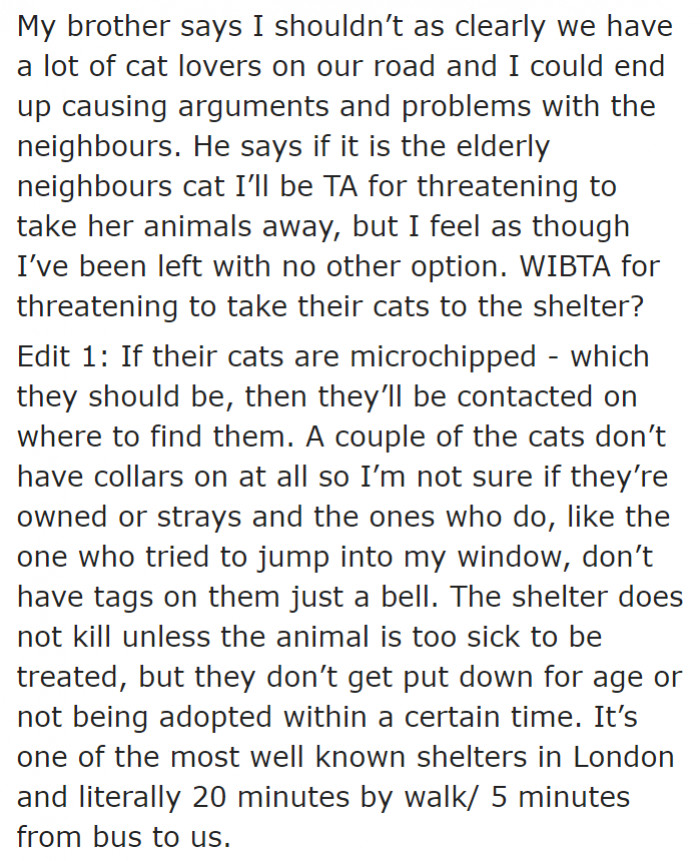
A lot of people agree that the OP can find more ways to keep the cats off their lawn.

Cultural Perspectives on Pets
Cultural differences play a significant role in how communities perceive outdoor pets. In some cultures, outdoor cats are common and accepted, while in others, they may be viewed as nuisances.
A study published in the Journal of Cross-Cultural Psychology highlights how these differing perceptions can lead to conflict among neighbors. Understanding and respecting cultural norms around pet ownership can help facilitate healthier interactions and reduce tension in neighborhoods.
This situation also highlights the potential for conflict arising from differing views on pet ownership.
Experts in conflict resolution suggest that addressing misunderstandings proactively can help mitigate tensions between neighbors.
Implementing community discussions or workshops on pet care and local regulations can foster understanding and cooperation.
There are also people who agree that pet cats should only stay indoors.
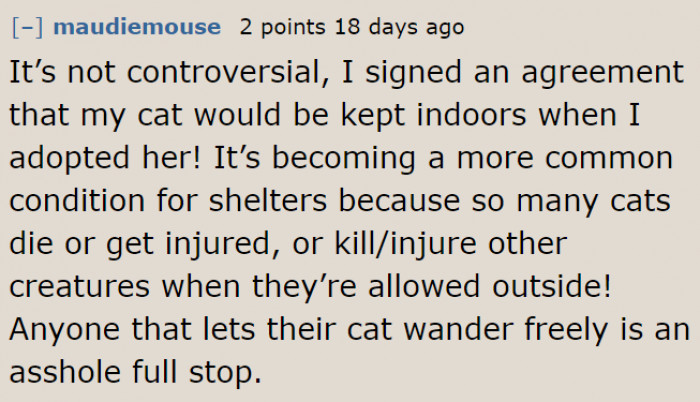
Cat ownership culture differs by country.
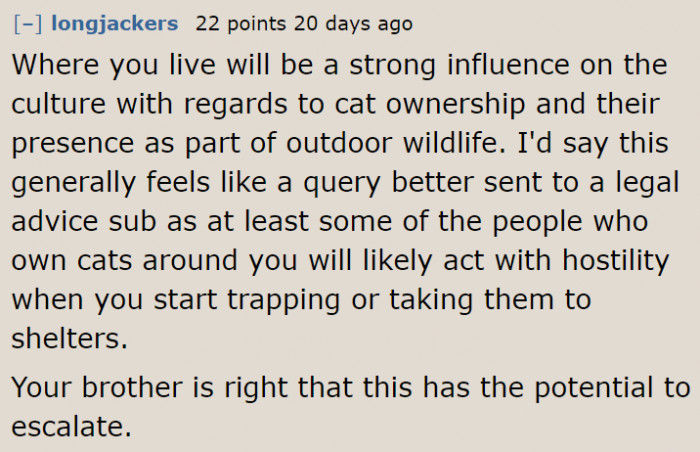
This Redditor believes the sign isn't the solution because it's not addressing the problem directly.
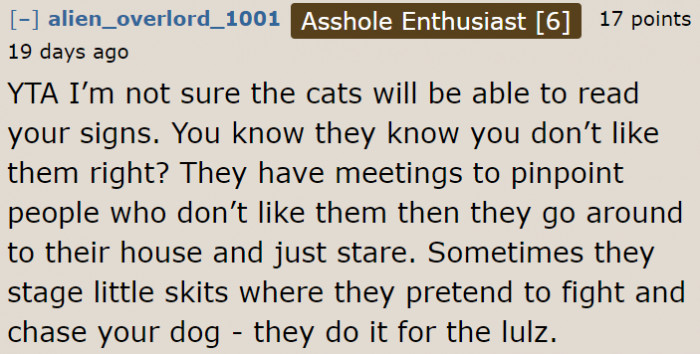
Dr. Emily Roberts, a behavioral psychologist, suggests that pet-related disputes often stem from unmet needs, such as the need for control or respect. When pets intrude on personal space, owners may feel their boundaries are violated.
Research indicates that establishing clear communication channels and setting mutual agreements about pet management can foster cooperation. This proactive approach not only respects each neighbor's boundaries but also promotes a sense of community.
Encouraging Respect for Neighborhood Pets
To navigate these cultural differences effectively, communities can benefit from developing shared guidelines for pet ownership.
Research shows that creating a collaborative approach to pet care can enhance neighborly relations.
Engaging residents in discussions about pet responsibilities and boundaries can promote mutual respect and understanding.
Not all people would agree to leash their cats, though.
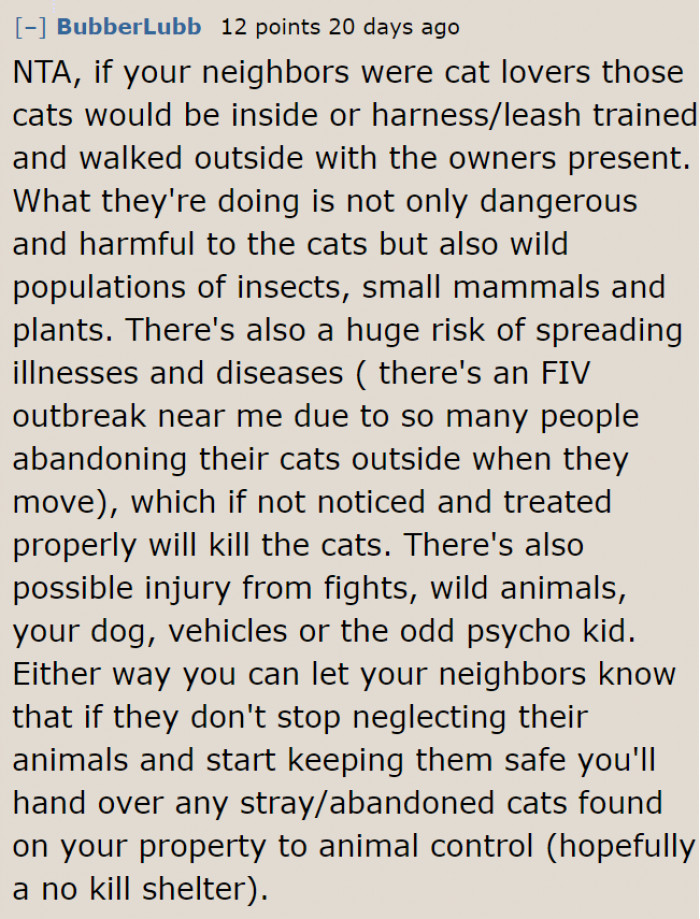
Cats outdoors are a risk to wildlife.
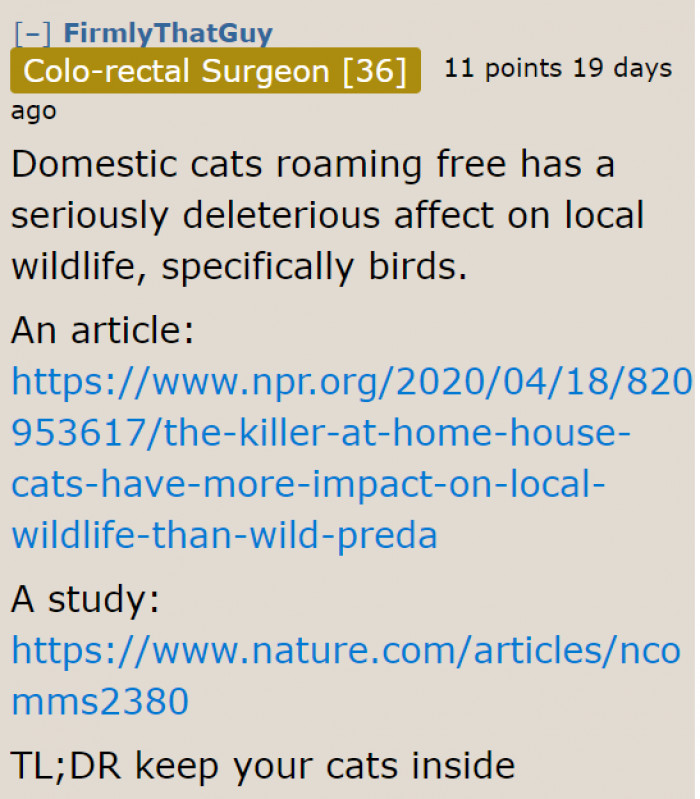
Another concerned citizen shares an article about letting cats outdoors.

Emotional Responses to Pets
Psychological research reveals that pets can evoke strong emotional responses, which might explain the heated reactions to trespassing animals. A study from the University of Michigan found that pet owners often experience increased anxiety when their pets interact with unfamiliar animals.
This anxiety can lead to overreactions, particularly when boundaries are perceived to be threatened. Addressing emotional responses through open dialogue can help reduce conflict and create a more understanding neighborhood atmosphere.
The UK and the US have different opinions on the matter.
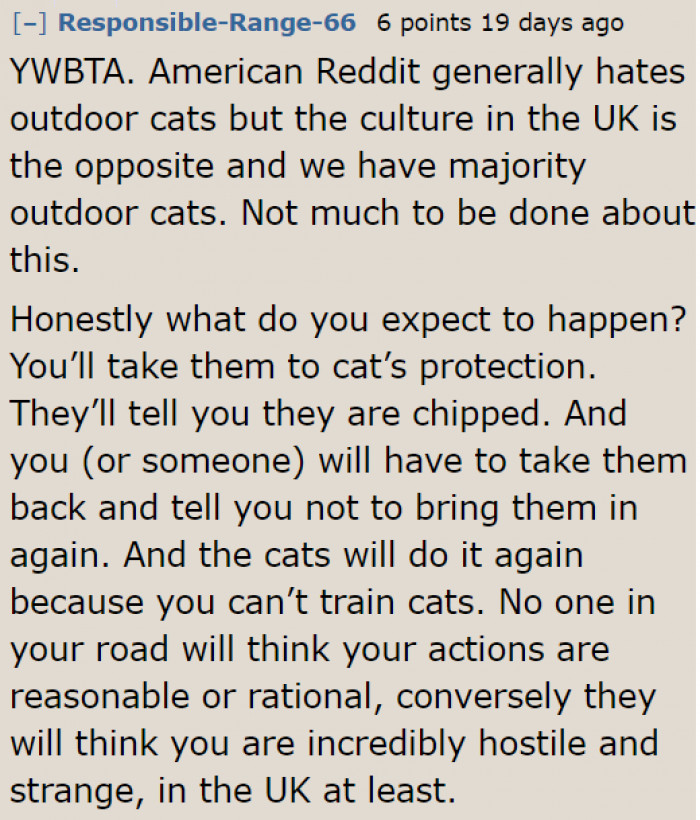
The best way, really, is to use products that keep cats away from the property.

The OP believes that it's practical to surrender the cats to a shelter.
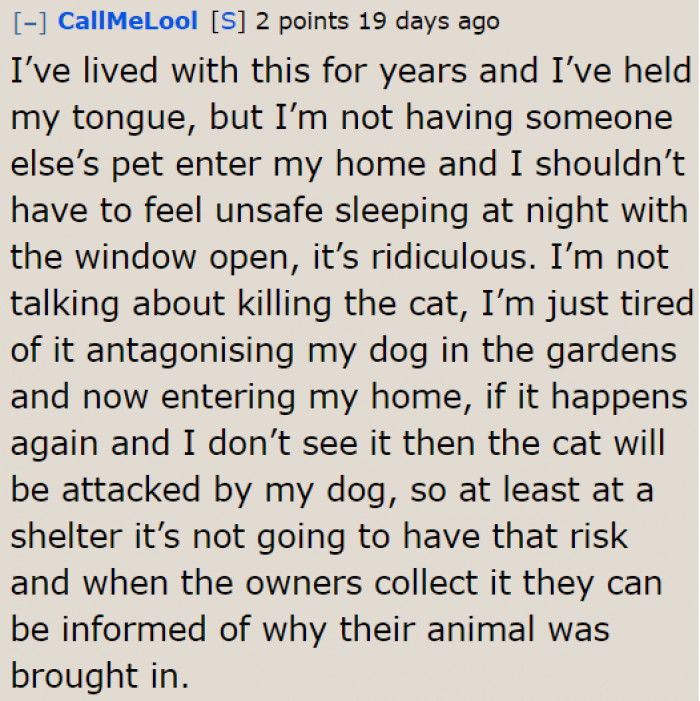
Setting boundaries is essential in addressing pet-related conflicts. According to a study published in the Journal of Environmental Psychology, establishing clear neighborhood guidelines can significantly reduce tensions.
Creating a community agreement about pets—like designated areas for outdoor play—encourages responsible pet ownership while respecting neighbors’ preferences. Engaging in community discussions and developing shared norms can foster a collaborative spirit, making it easier to navigate these disputes amicably.
The OP also wants to directly confront the cat owners.
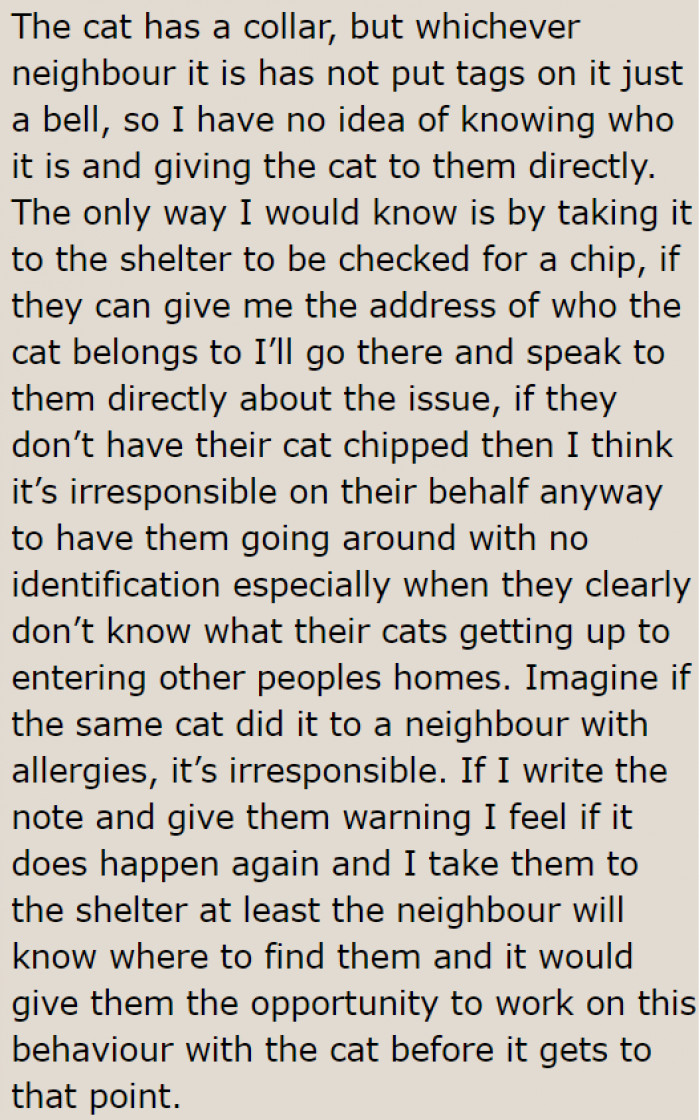
Cats with owners shouldn't be taken to the shelter, according to this Redditor.
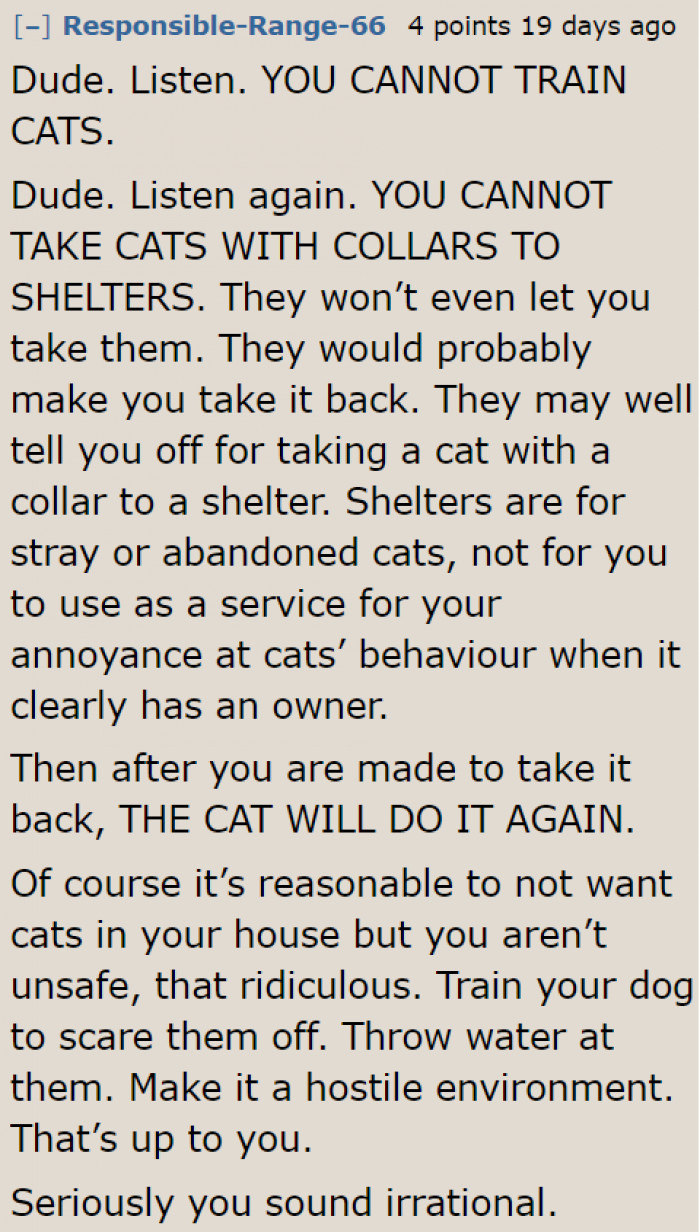
Some suggestions
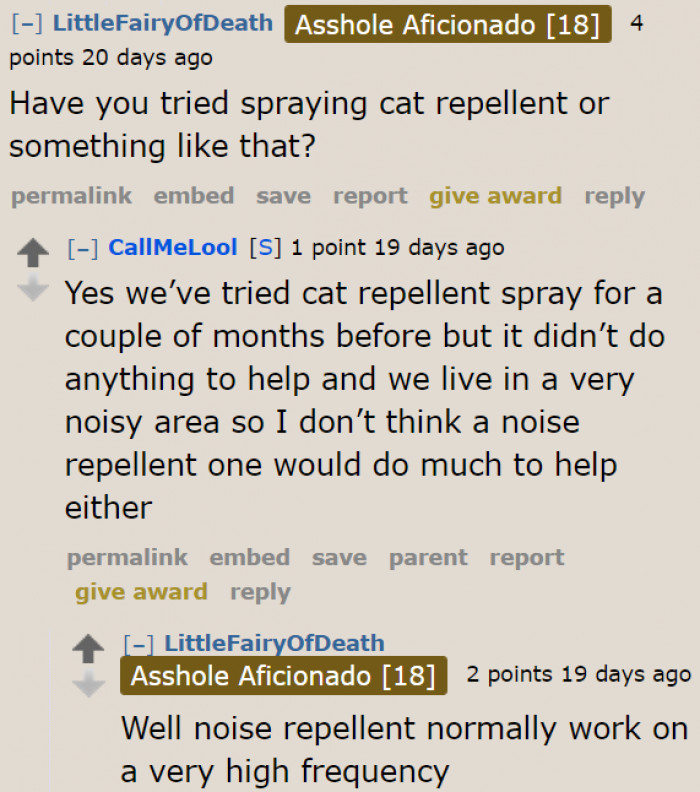
The Role of Communication
Effective communication is vital in resolving disputes over pets. Research indicates that many conflicts arise from misunderstandings rather than malice. A study from Harvard Business Review shows that active listening and empathy can transform contentious situations into collaborative problem-solving opportunities.
Fostering an environment where neighbors can express concerns without fear of backlash can significantly improve relationships and reduce the likelihood of future conflicts.
Some users don't have an issue with what the OP plans to do with the cats, as long as it's a no-kill shelter.
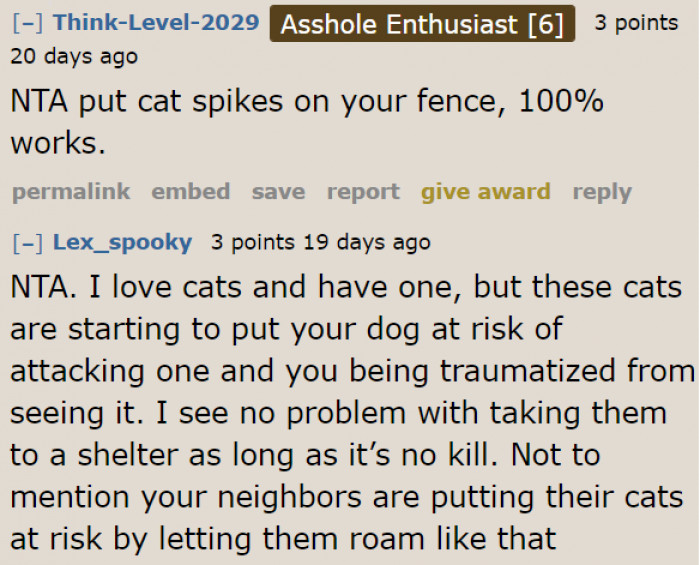
A Redditor agrees to put up a sign.

A cat owner believes that letting felines out is irresponsible.
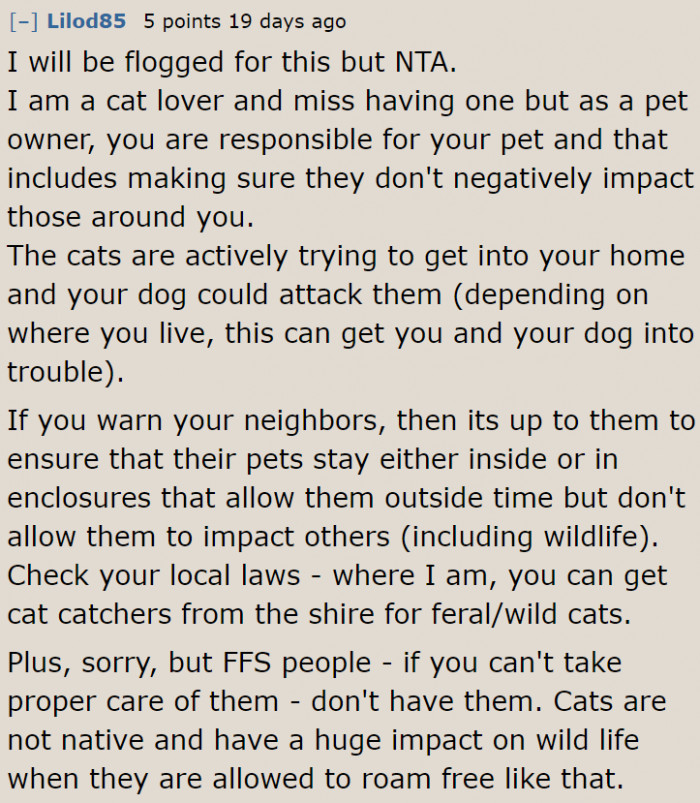
Dr. Lisa Thompson, a social psychologist, emphasizes the importance of empathy in neighborly relations. Her research indicates that understanding a neighbor's perspective can lead to more amicable resolutions.
Encouraging a mindset of empathy when addressing issues with trespassing pets is essential. This approach not only resolves the immediate conflict but also builds long-term relationships based on mutual respect and understanding.
The situation isn't anyone's fault, according to one Redditor.
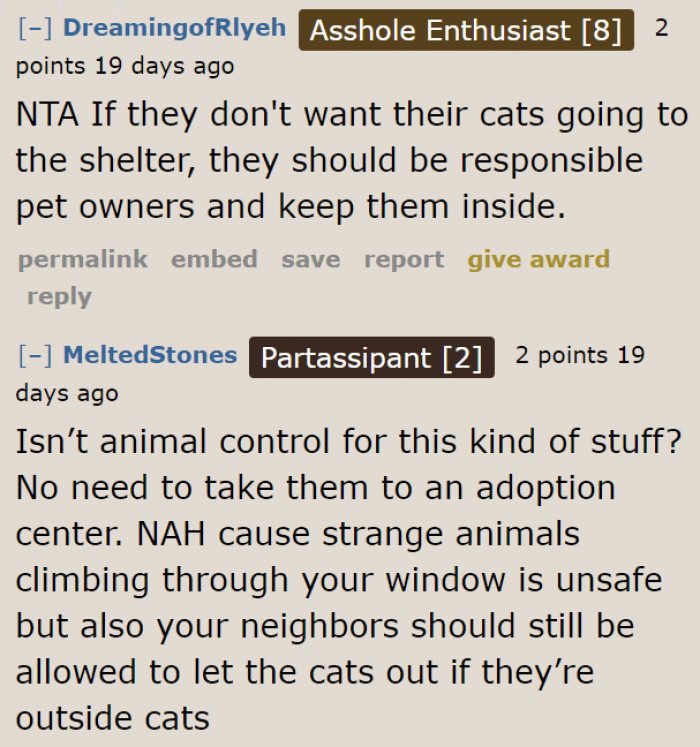
Ultimately, people agree that the OP's move to put up a sign isn't wrong. However, there are pet owners who still suggest finding effective ways to keep the felines away.
In this thread, you will also notice that there are different opinions about letting cats outside. Generally, the UK is okay with allowing them outdoors, but Americans aren't too fond of cats roaming around the streets and trespassing on properties.
Psychological Analysis
This incident illustrates the complexities of pet ownership, particularly in neighborhoods with diverse cultural perspectives.
Understanding and respecting these differences is essential for maintaining peaceful community dynamics.
Analysis generated by AI
Analysis & Alternative Approaches
In summary, the dynamics of pet ownership are deeply influenced by cultural attitudes and community norms.
According to Dr. William Doherty, family therapist, "Open communication about shared community spaces and responsibilities can significantly improve neighborly relations." He emphasizes that fostering dialogue around such issues can lead to a more harmonious living environment. Engaging with neighbors about pet ownership can help create mutual understanding and respect.
In summary, navigating conflicts related to trespassing pets requires a blend of empathy, clear communication, and cultural understanding. Research consistently highlights that interpersonal conflicts often stem from misunderstandings and unmet emotional needs.
By approaching these situations with a mindset of collaboration and respect, neighbors can foster a more harmonious living environment. Engaging in open dialogues and establishing community norms can significantly reduce tensions and improve relationships, ultimately benefiting everyone involved.



